
Sarah Palin and John McCain on stage, Sept 4, 2008 at the Republican National Convention in St. Paul, MN.
By the 1990s, SarahPalin was on her way up in Alaska politics. After she took down a three-term incumbent in a local race there, some of her opponents revived the “Sarah barracuda” nickname. That was 1996 when she became mayor of her hometown, Wasilla.
By 2008, the Republicans liked the barracuda moniker so much they decided to use the popular 1977 song “Barracuda” by rock group Heart to promote their new political star.
“Barracuda” was played at the 2008 Republican National Convention in early September 2008 on two occasions – when Palin gave her own speech at the convention when nominated to the VP slot, and a second time, when Palin came on stage after John McCain had given his speech, as friends and family joined them on stage. It was also used a time or two following the convention.
The song proved a lively addition to the McCain-Palin campaign, but not everybody was happy about it – including two of the song’s principal authors, Ann and Nancy Wilson.
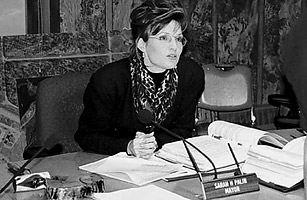
Sarah Palin, Mayor, Wasilla, Alaska, 1996-2002.
Heart History
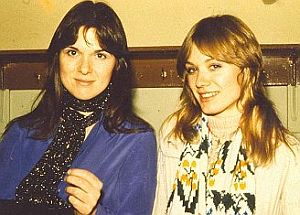
Early photo of Ann and Nancy Wilson, circa 1970s.
The Wilson sisters, born in the early 1950s, grew up in Southern California and Taiwan before the family settled in Seattle. As young girls, both became interested in folk and pop music. Ann never took formal music lessons as a child, though she later learned to play several instruments. Nancy took up guitar and flute. After both sisters spent time at college, they decided to try their hand as professional musicians. Nancy began performing as a folksinger, while Ann joined the Heart group, later followed by Nancy.
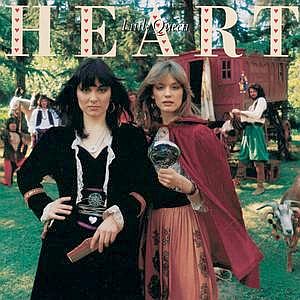
Heart’s “Little Queen” album of 1977 from which the highly successful single, “Barracuda” came. Click for album CD.
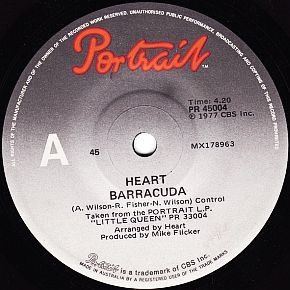
Single of Heart's 1977 hit song, "Barracuda," shown in Australian pressing. Click for digital single.
Ann Wilson had written “Barracuda” partly in angry reaction to a promoter who made disparaging remarks backstage about she and her sister Nancy being lesbians, a situation charged by an advertisement run by their Canadian music label at the time.
Music Player
“Barracuda” – Heart
1977
The offending ad used a photo of the two sisters bare-shouldered, back-to-back with the caption “This is our first time.” Wilson was enraged by her label’s use of the advertisement and the promoter’s remark. She wrote ‘Barracuda’ as a rant against the soulless, corporate nature of the music business, especially for women – ‘barracuda’ being her intentionally disparaging term for the music business. Some of the song’s lyrics, include, for example:
…No right no wrong, selling a song-
A name, whisper game.
If the real thing don’t do the trick
You better make up something quick
You gonna burn, burn, burn it to the wick
Ooooooh, barracuda.
Sell me sell you the porpoise said
Dive down deep down to save my head
You…I think you got the blues too.
All that night and all the next
Swam without looking back
Made for the western pools – silly fools!
If the real thing don’t do the trick
No, you better make up something quick
You gonna burn, burn, burn, burn, it to the wick
Ooooooohhhh, barra barracuda.
Although Ann wrote the lyrics, Nancy helped set it to music along with guitarist Roger Fisher and drummer Michael DeRosier. “Barracuda” soon became one of the band’s signature tunes and is still heard on American classic rock radio stations. In subsequent years, the song also appeared on several “best” lists – ranked 34th, for example, among VH-1’s “best hard rock songs” in 2009.
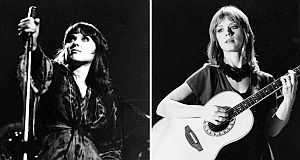
Ann and Nancy Wilson of Rock group Heart, 1970s.
McCain-Palin
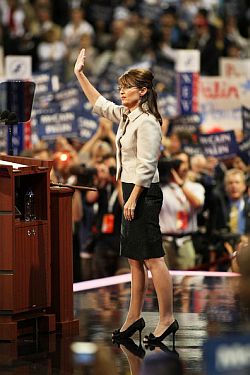
Sarah Palin at VP acceptance speech, Republican Nat’l Convention, Sept 3rd, 2008.
On September 3rd, 2008, the night of her speech, Rudy Giuliani, former Mayor of New York City, was one of those who spoke prior to Palin, generally attacking the Democrats and warming up the crowd. The former mayor also praised Sarah Palin in his remarks as “one of the most successful governors in America—and the most popular… She already has more executive experience than the entire Democratic ticket.” And before Palin came on to give her acceptance speech, Heart’s classic song, “Barracuda,” was played to help energize the crowd.
In Palin’s speech, she introduced her family and described her life in Alaska, saying she was just “an average hockey mom.” However, she also portrayed herself as a reformer and a fighter for change, and commented on some negative publicity that had already come her way: “Here’s a little news flash for all those reporters and commentators: I’m not going to Washington to seek their good opinion. I’m going to Washington to serve the people of this great country” – a line that drew great crowd reaction, as did others.
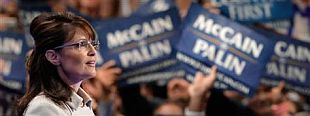
Sarah Palin, during acceptance speech, RNC, Sept 2008.
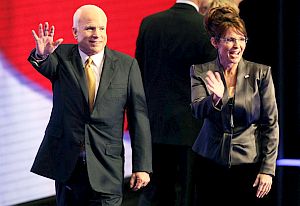
John McCain and Sarah Palin on stage at the RNC on September 4th, 2008 after McCain’s acceptance speech.
After McCain finished his speech, Palin joined him on stage. (see video below). As the two candidates and their families and core supporters gathered on stage as is customary, the red white and blue confetti and balloons began falling. And after about a minute-and-a-half or so into the closing event, during which some patriotic-sounding music had played, the unmistakable guitar riff of Heart’s “Barracuda” could be heard, and the song continued to play in its entirety as the TV cameras panned the candidates, their families, and the crowd.
The lively song energized the crowd. Boston Globe writer David Beard later observed: “The song seemed a much better fit than several played during the Democratic convention in Denver.” A week earlier, the house band at the Democratic convention had played “Still The One,” the 1970s hit from Orleans, as tribute to U.S. Senator Ted Kennedy after his pro-Obama speech, and also the 1985 song, “Addicted to Love” by Robert Palmer, after former President Bill Clinton’s speech. The video of the RNC gathering at left captures the convention’s closing moments as “Barracuda” played, with some delegates on the convention floor bouncing up and down to the Heart song. Palin and McCain strolled out on the end of the cat walk together at one point while the song played. Other music followed toward the end of this session, as McCain and Palin fanned out into the audience in different directions shaking hands.
Wilsons Object

Heart’s Ann and Nancy Wilson during earlier times in their careers.
An angry Nancy Wilson went to the media to respond. “I think it’s completely unfair to be so misrepresented,” she said in a phone call to Entertainment Weekly after McCain’s speech and the second use of “Barracuda.” Wilson was clearly bothered by the association of the Heart song with Sarah Palin and said so in a statement she e-mailed to EW.com:
“Sarah Palin’s views and values in NO WAY represent us as American women. We ask that our song ‘Barracuda’ no longer be used to promote her image. The song ‘Barracuda’ was written in the late 70s as a scathing rant against the soulless, corporate nature of the music business, particularly for women. While Heart did not and would not authorize the use of their song at the RNC, there’s irony in Republican strategists’ choice to make use of it there.”
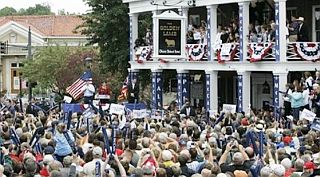
McCain-Palin campaign rally in Lebanon, Ohio on Sept 9, 2008 where Heart’s “Barracuda” song was played, despite protests of Ann & Nancy Wilson. AP photo.
Meanwhile, other former members of the Heart group did not appear to be that concerned over the McCain-Palin use of the song. In an appearance on a Seattle talk show, song co-writer and lead guitarist Roger Fisher announced he was thrilled with the RNC’s use of the song because it resulted in royalties for the band and gave him an opportunity to publicly point out that he was a “staunch” supporter of Barack Obama. Michael DeRosier, lead drummer on the recording and song co-writer, also supported the use of the song by the RNC.

Campaign placard supporting Sarah Palin in the Lebanon, Ohio crowd, September 9, 2008.
Apparently, the McCain-Palin campaign did have the correct license. Like thousands of other songs, “Barracuda” is distributed by the American Society of Composers, Authors and Publishers (ASCAP). Any entity licensed with the ASCAP can play a song without getting the artist’s explicit permission. The McCain- Palin campaign paid a blanket fee to the ASCAP in order to obtain licensing to use the song. That being the case, the Wilson sisters didn’t have much legal recourse.
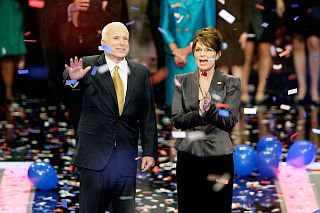
Sept 2008: Republican Presidential and Vice Presidential candidates, Senator John McCain and Gov. Sarah Palin, enjoying the crowd & music on stage at their convention.
Heart’s Nancy Wilson later reported in a 2010 interview with Classic Rock magazine that there were some tense times on the road with fans following the controversy over the McCain-Palin use of the Barracuda song. “Some of the fans decided they didn’t like us and didn’t like our music anymore. At least for a while. We were out on the road, and the next show that we played after that was somewhere in Florida — which is not where you wanna be if you’re a Democrat. “Some of the fans decided they didn’t like us and didn’t like our music anymore. At least for a while….We were kinda nervous, but we upped our security…” We were kinda nervous, but we upped our security and kept a close watch on people walking in. Luckily — knock on wood — of all the crazies who have threatened to take us down, nobody so far has done that.”
The Heart-Palin incident with “Barracuda,” however, wasn’t the only example of music-related controversy during the 2008 presidential campaign. Right before McCain introduced Palin in Dayton, Ohio in late August 2008, the campaign played the song “Right Now” by Van Halen. A few hours later, Van Halen’s publicist told MTV News that McCain was never granted permission to use the track, and had permission been sought, it would never have been granted. Earlier that year, in February 2008, John Mellencamp requested that McCain stop using his songs, “Our Country” and “Pink Houses,” on the campaign trail. The Foo Fighters, Frankie Valli, ABBA, and Bon Jovi had also lodged objections with the McCain-Palin campaign over the use of their music. Jackson Browne brought legal action against the Ohio Republican Party for using “Running on Empty” during an attack ad on Obama. Nor were the Democrats free of music-use controversy in the 2008, as Barack Obama’s campaign caught some criticism for its use of Brooks & Dunn’s “Only in America” after his nomination-acceptance speech. The Obama campaign also had a rowel with Sam Moore, of the former Motown group Sam & Dave, when the Obama campaign used “Hold On, I’m Comin’” at rallies, which they voluntarily quit playing.
Other stories at this website dealing with music and politics include, for example: “I’m A Dole Man,” “I Won’t Back Down,” and “Ray Sings America.” Thanks for visiting — and if you like what you find here, please make a donation to help support this website. Thank you. – Jack Doyle
|
Please Support Thank You |
____________________________________
Date Posted: 10 March 2012
Last Update: 14 January 2019
Comments to: jdoyle@pophistorydig.com
Article Citation:
Jack Doyle, “Barracuda Politics, 2008,”
PopHistoryDig.com, March 10, 2012.
____________________________________
Sources, Links & Additional Information
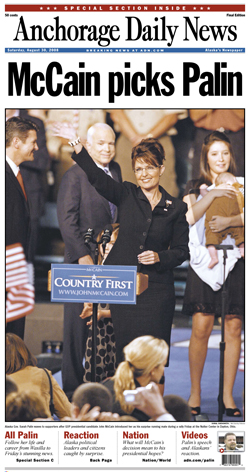 Headlines from August 2008 after Republican Presidential candidate and U.S. Senator John McCain, picked Alaska Governor Sarah Palin to be his running mate. |
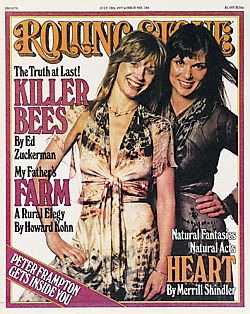 Rolling Stone magazine cover of July 1977 featuring Nancy & Ann Wilson of the rock group Heart. |
Whitney Pastorek, “Exclusive: Heart’s Nancy Wilson Responds to McCain Campaign’s Use of ‘Barracuda’ at Republican Convention,” EW .com, September 5, 2008.
David Beard, “Heart to McCain/Palin: Back off on ‘Barracuda’,” Boston Globe, September 5, 2008.
Daniel Kreps, “Heart Lash Out At McCain Campaign’s Use of “Barracuda’,” Rolling Stone .com, September 5, 2008.
Jason Ankeny, “Heart,” Biography, All Music .com.
“Heart (band),” Wikipedia.org.
“Barracuda”(song),Wikipedia.org.
Denise Sullivan, “Barracuda,” Song Review, AllMusic.com.
“Heart: The First Sisters of Rock & Roll,” VH1.com, March 2010, “Behind The Music” Series, Episode 59.
Mark Halperin, “Sarah Palin, Grade: A+,” The Republicn Naitonal Convention, Time, 2008.
Ashby Jones, “McCain Campaign to Go Heart-less?,” Law Blog, Wall Street Journal, September 5, 2008.
Gina Serpe, “Republicans Take Heart; Heart Takes It Back,” Eonline.com, Friday, September 5, 2008.
“Heart to Sarah Palin: Don’t Play ‘Barracuda’,” Fox News, Friday, September 5, 2008.
Claire Suddath, “John McCain: Take a Chance on Me; Barracuda” (with video), Time.com, “A Brief History of Campaign Songs.”
“Heart’s Roger Fisher Thrilled With RNC ‘Barracuda’ Play,” Summary of Interview with Roger Fisher, by Dori Monson, KIRO Radio, 97.3 FM, Seattle, WA.
David Hinckley, “Campaign Song High Notes and Low Notes,” NYDailyNews.com, September 9, 2008.
J. Vena, “McCain-Palin Campaign Continues Playing Heart’s ‘Barracuda,’ Despite Band’s Protest; Republican presidential campaign says it obtained proper license to use the song,” MTV.com, September 9, 2008.
“McCain and Palin Once Again Play ‘Barracuda’,” CNN, September 9, 2008.
Ben Werschkul, The Caucus, “Despite Heartfelt Protest, Barracuda Plays On,” New York Times, September 9, 2008.
“Best part of last night of GOP Convention,” YouTube.com.
Chris Wilson, “Will McCain’s Heart Stop? Whether the Campaign Needs Permission to Play “Barracuda’,” Slate.com, September 2008.
“Nancy Wilson Recalls Heart’s Pro-Palin Backlash From ‘Crazies’,” WMMR.com, (Bala Cynwyd, PA), August 23, 2010.
Sarah Schacter, “The Barracuda Lacuna: Music, Political Campaigns, and the First Amendment,” The Georgetown Law Journal, February 14, 2011.
“2008 Republican National Convention,” Wikipedia.org.
______________________________